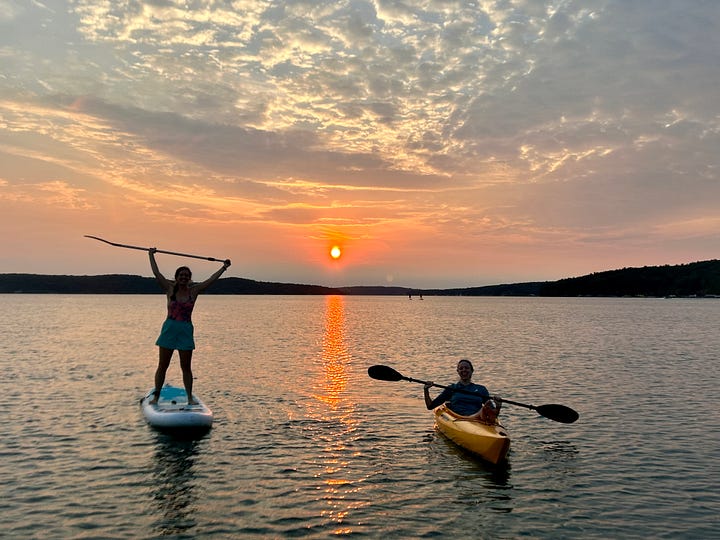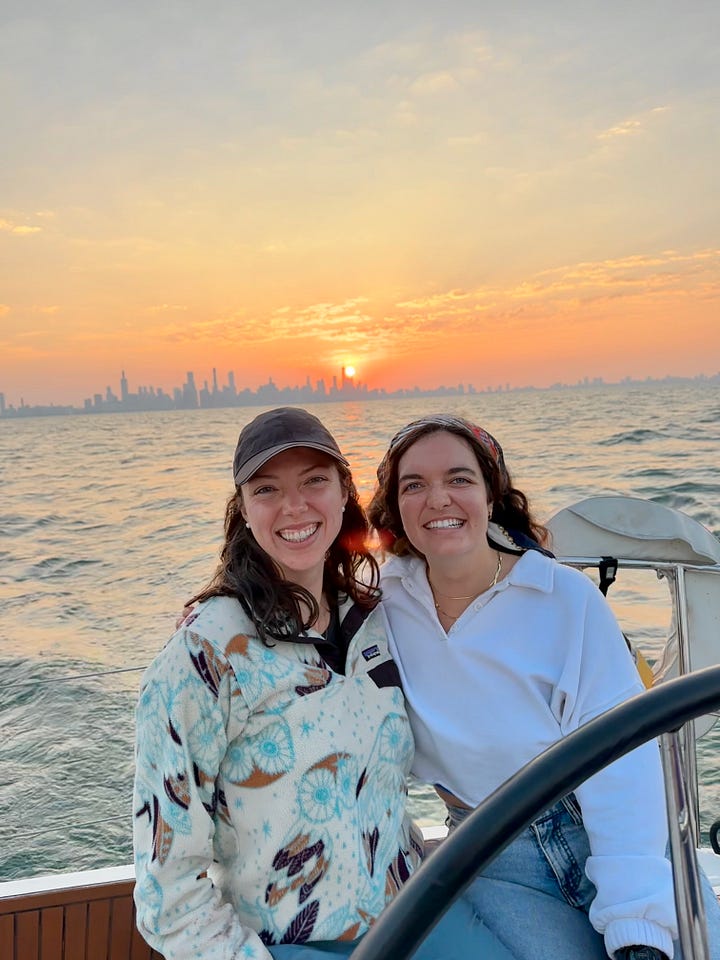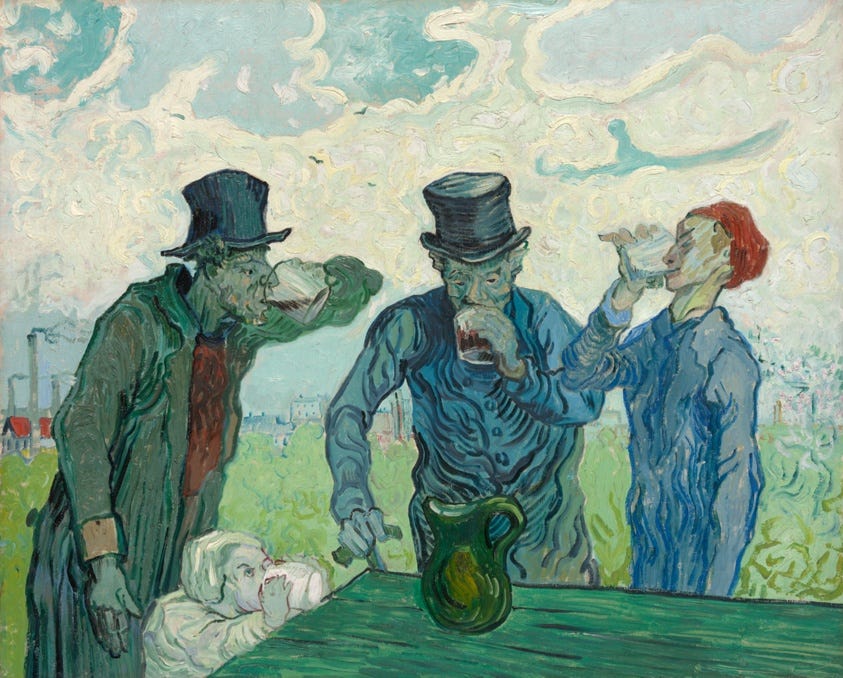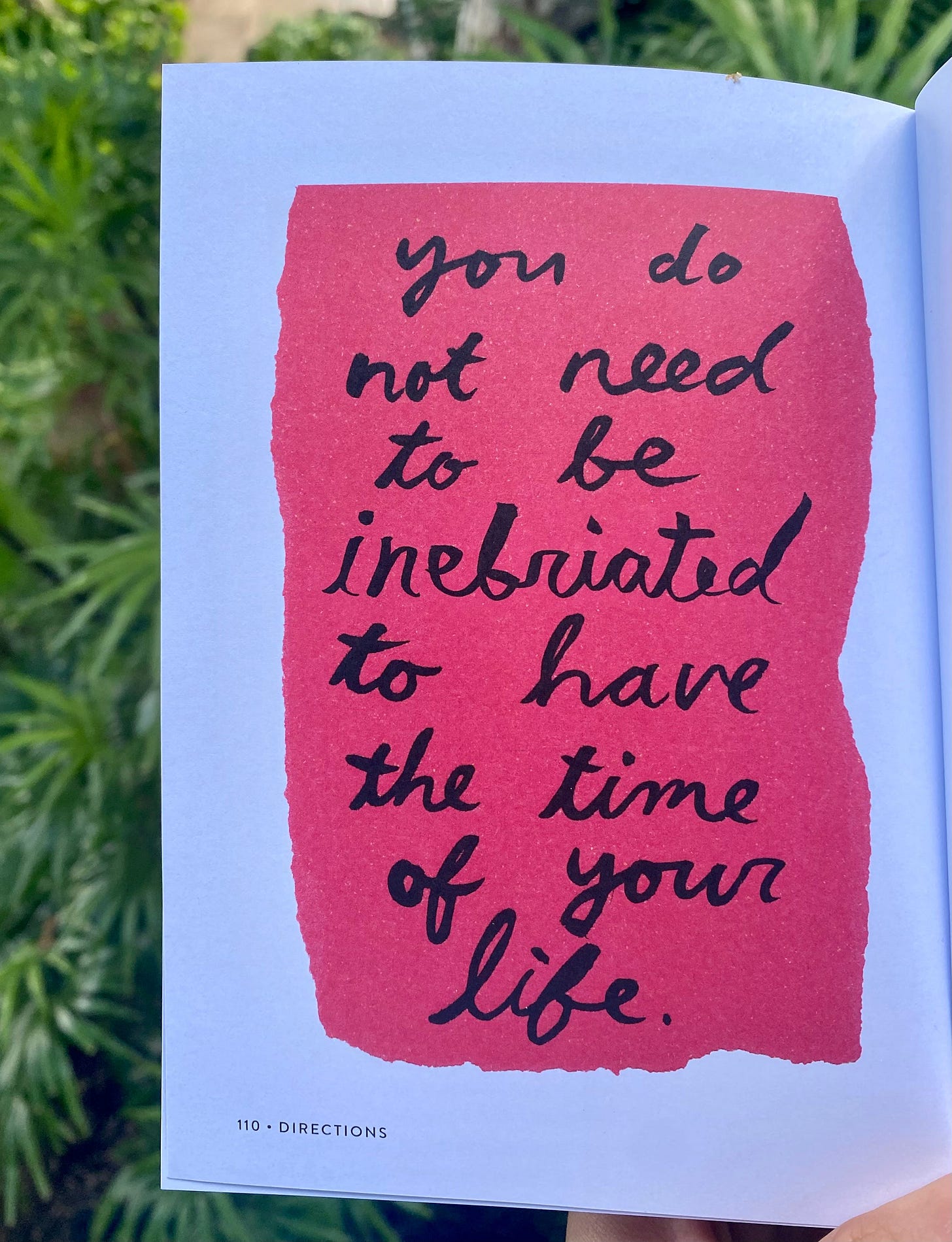🍾 Lessons From One Year Alcohol-Free
Letter 173
If you are new here or missed last week's edition, you can catch up on the past letters here. If you are reading this for the first time, I’d love you to sign up below to join the other learn-it-alls:
Aloha fellow learn-it-all 👋
Greetings from Chicago, Illinois
It’s my first time here in over two years, and it feels weird. I’ve been here for less than a day and already was blessed to be invited on a mutual friend’s sailboat. Twas a beautiful evening to admire the city’s grand architecture from afar while being on the water.
Watching the little egg yolk sun disappear behind the skyscraper buildings and seeing the skies fall away from warm tones into deeper shades of black and blue left me breathing easy and soaking in gratitude.
Now, let’s dive into letter 173 from a learn-it-all. Enjoy!
❓Question to think about
How did this whole “alcohol-free” experiment start?
🖊️Writing
Last summer, somehow I stumbled into an addiction circle on a Wednesday night. I sought peace from my traveling and wedding-filled summer. I found myself at a Zen Center in Denver, Colorado. The meditation started with a short 25-minute period, and the next thing I knew, I was ushered into a room to sit in a circle for a recovery group. One by one the eight of us verbalized substances or behaviors that we were seeking healing from.
Me, my sweaty palms, and perspiring armpits wanted to leave immediately before sharing.
“Hi my name is Jen, and I have a problem with drinking.”
Shame poured out of me, like I was a teenager in a confessional at the Catholic church. But after sharing, I felt safe and nonjudgmentally heard. It was refreshing to encounter this environment.
When I shared that I had a problem with drinking, it wasn’t that I was addicted.
There are many casual (non-addicted or abusive) uses and over-use of alcohol that society tells me are not an issue. The culture of drinking hasn’t been aligned with my priorities or adding value to my life for the past couple of years.
Despite not feeling fully understood by the people with addictions, I was glad to be there. It was comforting to vulnerably share my struggles aloud for the first time in front of a room of adults who also had unhealthy relationships with inebriants. I no longer felt alone in the struggle with different substances that present the illusion of a better life (for a short while).
Me and alcohol have had a complicated situationship. It started when I wanted to become less shy, more fun, and fit into cool friend circles, not just the nerds. It served me for a time to experiment with my identity while in search of belonging, connection, and courage.
On August 29th, 2022, I decided to start my alcohol-free year.
There were several beliefs that culture made me believe as true about what it meant to be alcohol-free. These could have stopped me from starting my experiment to stop drinking in the first place. I wanted to see for myself if my fears were true.
Five fears from my younger self debunked and lessons from one year of being alcohol-free
(1) I won’t have any friends.
A transition happened from my youth to adulthood. Playdates shifted from sumo wrestling with pillow-padded t-shirt fights and lemonade stands to day drinking and keg stands. I definitely make fewer friends who spend their weekends drinking because that isn’t a pastime of mine anymore.
Some of my friends still drink, but they are also committed to early morning adventures and to their health. Before I started this year of being alcohol-free, I considered myself “sober-curious”. I'd drink for special occasions but never spontaneously. I’ve found it’s much easier to always say “no” rather than to sometimes say “yes”.
Being judged or disliked by opting out is scary. But I trust the journey I am on to reinvent myself as someone who doesn’t count on drinking. It takes confidence in myself and a search to find people who make me feel safe as my goofier self without needing a substance. True friends will respect my decisions and will never peer pressure me into drinking.
Is it too much to ask for a book club to be about the book rather than more about the type of wine poured? I get lit from ideas while stone-cold sober.
Lesson: A real friend will accept you as you are.
(2) It’ll be impossible to make social plans.
It seemed this magical substance of alcohol would be my antidote to be liked and have courage. These inebriants are much of what my previous friendships centered around. It led to shallowness throughout my connection—while, on paper (or my iMessage log) my phone was ringing off the hook for parties to attend. I kept feeling a lack of integrity. Dissonance bubbled up within myself, since I moved to a place to live healthier, while still pitying my liver for having to put up with the poison I volunteered to swallow (and sometimes chug).
Since not drinking, I have made some of the most genuine friendships. These have taken place in unexpected places like bookstores, surf breaks, and getting SCUBA certified which have brought up a spark of genuine connection and joy. Believe it or not, to seek out connection, you don’t need to be inebriated. Only a few moments of courage to spark a similar interest and a thoughtful follow-up can make a social plan with someone.
Yes, male I just met on Hinge dating app, that is correct, you see that I do not like drinking alcohol, so please do not suggest our first date be at a brewery.
Lesson: Like attracts like. Make social plans with people who align with your ideal lifestyle.
(3) I’m missing out on more fun.
Drinking used to feel like a sneaky form of rebellion. It is seen as the mature way to keep the kids out of the club since you need to be 21. Drinking is the old definition of how adults like to have fun that I inherited. I flocked to this pastime to quickly context switch, let loose, seek belonging in new social circles, or look for something to do.
I actually find that I have a lot more fun than I ever thought I could while not drinking. I’ve done things that I never thought I would without having liquid courage, like dance on a strip pole or send a video to a favorite musician for free tickets hours before the concert. I get to channel presence and remember these experiences a lot better. Drinking no longer replaces real sensations with artificially enhanced ones.
Lesson: You create your own definition of fun.
(4) People will think I’m a recovering alcoholic.
Contrary to what a friend sarcastically shared after I denied a free drink at a sailing party, I am not an alcoholic. Alcohol Use Disorder (AUD) is never something I’ve been diagnosed with. Abstaining from the activity altogether is best for my health, my sleep, and my sanity.
I know it is inevitable in my future that people will continue to kindly offer me alcoholic drinks, and despite my actions, still believe I am an alcoholic. It is not my job for everyone I encounter in my life to understand me. I am not hurting anyone’s life by abstaining. I’ve learned that having a beverage in my hand keeps people from asking about what I like to drink.
Lesson: It is a choice whether to share your rationale behind your actions. It is your business after all.
(5) People will think I am against drinking.
No, this is not true, I have many people I love who enjoy a cold brew or a glass of wine. I see the value that drinking can add for a season that they’re in. If drinking continues to add value to someone’s life and is in alignment with their priorities, then by all means continue. My dream job out of college was working for Heineken in Amsterdam, and for a variety of reasons of what I prefer to fill my life and body with, I have grown away from this dream.
Lesson: Respect people’s choices of how they live.
So in summary my lessons from one year of being alcohol-free are:
A real friend will accept you as you are.
Like attracts like. Make social plans with people who align with your ideal lifestyle.
You create your own definition of fun.
It is a choice whether to share your rationale behind your actions. It is your business after all.
Respect people’s choices of how they live.
Initially, I chose to try this experiment out of rebellion. I like to question the status quo, which includes the notion that twentysomethings need alcohol to have fun. That was the old way of how I made friends. Since walking in these alcohol-free shoes, I realize I have invented a new version of myself that defines fun and feels courageous on my own terms without alcohol. In my year of being alcohol-free, I have completed three triathlons and nurtured some of the most rewarding friendships in my life. I’m not looking back. I feel the most healthy and happy in my life thanks to cutting out drinking. My health is my wealth.
I'm focused on the long-term game. Drinking for me was a short-term game. It was a cheap sense of joy— a way to numb myself to cope with another problem like lacking confidence, courage or connection.
Since eliminating something that used to bring fun and facilitate friendship, I’ve been able to embrace life without it. I still don’t miss drinking and plan to continue living without a relationship with these inebriants.
Not a morning goes by where I say “I wish I drank last night.”
🌟Quotes to inspire
“I don't do drugs. I am a drug.” - Salvador Dali
"You do not need to be inebriated to have the time of your life. " - Hallie Bateman
📸 Photos of the Week


Some sunset shots from my week with my sister from another mister:
The left shot was taken by our new friend Deedee while standup paddle boarding and kayaking on Walloon Lake.
The right shot was taken last night while sailing on Lake Michigan outside of Chicago. This is after our 8-hour road trip with fun stops like eating sandwiches in a Dollar General parking lot next to Lake Cadillac and for cheese, black licorice and ice cream in Holland, Michigan.
🙏Shoutouts
To all the non-drinkers who have inspired me from up close and afar: Sarah Wood, Nicole Prentice, Kyle Bowe, Sara Cassin, and David Nebinski.
A special shoutout to my non-drinker friend Allison Mobley who proofread, contributed to many discussions on this piece and is pursuing a career in addiction medicine. She recommends this on how to talk about addiction.
To my sober curious friends - Claire Edwards, Emily Richner, Ben Bradbury, and Alivia Duran
This piece wasn’t written alone. Thank you to the editors including Michael Shafer, Indigo Habel, Shanece Grant, and Amber Williams
To the author Hallie Bateman for playfully showing me in her book Directions that I could redefine fun
I appreciate you reading this!
If ideas resonate, I’d love you to press the heart button, leave a comment, reply to this email, or reach me at vermetjl@gmail.com. If you forgot who I am, I welcome you to my online home.
Never stop learning 😁
Mahalo 🌺
Jen
PS - in case you missed last week’s letter on 🪄 How to Create your Modified Magical 30
If you’re reading this because someone shared this newsletter with you, welcome! I’d love it if you subscribed:






Love how you put a bow on this with calling out the lessons learned! x
Hi Jennifer,
The biggest part of problems we incur is admitting we have a problem and the second half is conquering that problem. Congratulations to you on both accounts. You have found the upmost respect for yourself and your body and soul. May God continue to give you the strength and endurance to continue the good life you have chosen.
Always Loving and Caring,
Aunt Vickie ❤️🤗